2017.3.4大二英语讲义常州新程
- 格式:pdf
- 大小:159.91 KB
- 文档页数:4
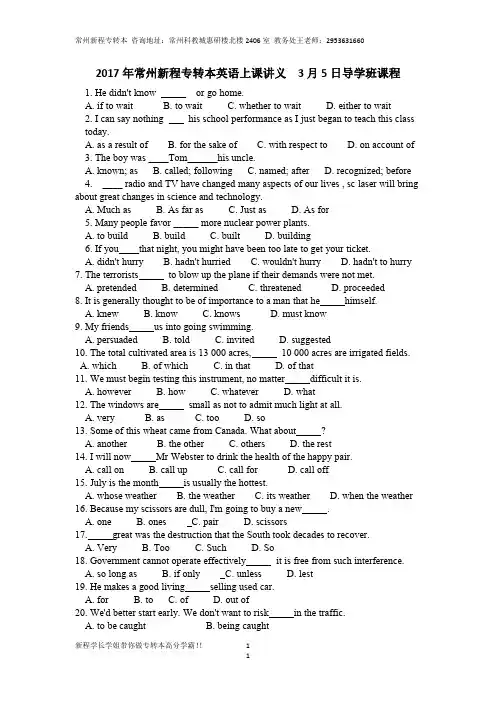
2017年常州新程专转本英语上课讲义3月5日导学班课程1.He didn't know or go home.A.if to waitB.to waitC.whether to waitD.either to wait2.I can say nothing his school performance as I just began to teach this class today.A.as a result ofB.for the sake ofC.with respect toD.on account of3.The boy was____Tom______his uncle.A.known;asB.called;followingd;afterD.recognized;before4.____radio and TV have changed many aspects of our lives,sc laser will bring about great changes in science and technology.A.Much asB.As far asC.Just asD.As for5.Many people favor_____more nuclear power plants.A.to buildB.buildC.builtD.building6.If you____that night,you might have been too late to get your ticket.A.didn't hurryB.hadn't hurriedC.wouldn't hurryD.hadn't to hurry7.The terrorists to blow up the plane if their demands were not met.A.pretendedB.determinedC.threatenedD.proceeded8.It is generally thought to be of importance to a man that he himself.A.knewB.knowC.knowsD.must know9.My friends us into going swimming.A.persuadedB.toldC.invitedD.suggested10.The total cultivated area is13000acres,10000acres are irrigated fields.A.whichB.of whichC.in thatD.of that11.We must begin testing this instrument,no matter difficult it is.A.howeverB.howC.whateverD.what12.The windows are small as not to admit much light at all.A.veryB.asC.tooD.so13.Some of this wheat came from Canada.What about?A.anotherB.the otherC.othersD.the rest14.I will now Mr Webster to drink the health of the happy pair.A.call onB.call upC.call forD.call off15.July is the month is usually the hottest.A.whose weatherB.the weatherC.its weatherD.when the weather16.Because my scissors are dull,I'm going to buy a new.A.oneB.onesC.pairD.scissors17.great was the destruction that the South took decades to recover.A.VeryB.TooC.SuchD.Soernment cannot operate effectively it is free from such interference.A.so long asB.if onlyC.unlessD.lest19.He makes a good living selling used car.A.forB.toC.ofD.out of20.We'd better start early.We don't want to risk in the traffic.A.to be caughtB.being caughtC.to have been caughtD.having been caught21.When I passed the office,I heard my name.A.mentionedB.mentionC.be mentionedD.to mention22.It was after he had made a thorough investigation he came to know the actual state of affairs.A.thatB.thenC.so thatD.therefore23.The man for his frankness,will make a speech at the meeting.A.knowingB.knownC.being knownD.having known24.A fence needs the support of three stakes,?A..needn't it.B.doesn't itC.shan't itD.isn't it25.Some of the greatest scholars are incapable when it comes on their knowledge to others.A.to passingB.passC.have it passedD.having it passed26.The Rocky Mountains we will soon be flying are very beautiful.A.thatB.over whichC.whenD.which27.You are permitted into the cinema for the film,you sat at the back.A.seeing thatB.for fear thatC.provided thatD.in order that28.his carelessness,he failed the examination.A.In spite ofB.In case ofC.In regard toD.On account of29.I couldn't understand the lecture,and.A.neither could SueB.so couldn't SueC.Sue couldn't neitherD.Sue couldn't also30.We had to dried milk as fresh milk wasn't available.A.face up toB.fall back onC.add up toD.put up with31.If it too much trouble I'd love a cup of tea.A.isn'tB.weren'tC.wasn'tD.hadn't been32.After seemed an endless wait,it was his turn to step into the doctor's office.A.itB.thatC.whatD.there33.She's going to the photographer's.A.to have her photograph takeB.to have her photograph takingC.to have her photograph takenD.to have taken her photograph34.Because of the emphasis placed on classroom work,the instructor will report your absences to the adviser.rgeB.hardC.strongD.high35.you decide to take up,you should try to make it a success.A.If onlyB.UnlessC.WhereverD.Whatever36.Everyone should keep a sense of responsibility what he is to do.A.ofB.forC.withD.to37.The statue is believed by a professional thief a couple of weeks ago.A.to have stolenB.to be stolenC.having been stolenD.to have been stolen38.Neither Bill nor his parents at home.A.areB.isC.wasD.has39.I don't think there are several characteristics of the novel special attention.。
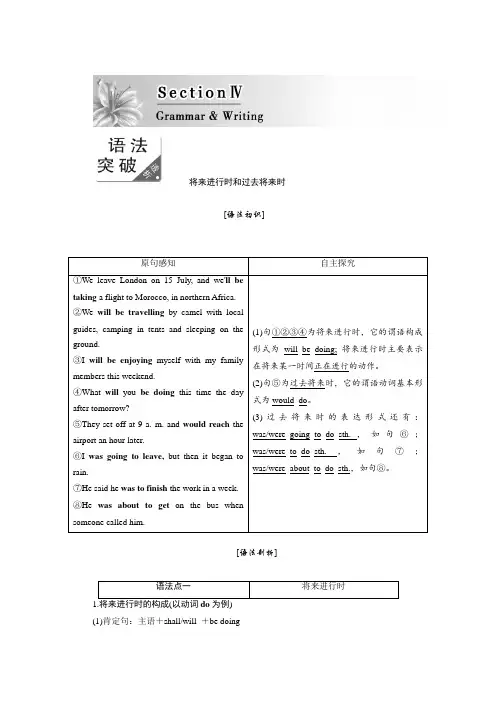
将来进行时和过去将来时[语法初识][语法剖析]Tomorrow we'll be flying to Paris.明天我们将乘飞机飞往巴黎。
(2)否定句:主语+shall/will+not+be doingI hope you won't be feeling too tired.我希望你不会觉得太累。
(3)一般疑问句:Shall/Will+主语+be doing?Will you be doing your homework this time tomorrow?明天这个时候你将正在做作业吗?(4)特殊疑问句:特殊疑问词+shall/will+主语+be doing?What will you be doing at eight tomorrow morning?明天上午8点你做什么?2.将来进行时的用法(1)表示将来某一段时间内持续做的动作。
Tom will be climbing in the Himalayas all next week.汤姆整个下周的时间将一直在攀爬喜马拉雅山。
(2)表示将来某个时间前已开始做的动作并很有可能继续下去。
Tom will not be in London next Tuesday. He will be climbing in the Himalayas.汤姆下周二将不在伦敦,他将一直在攀爬喜马拉雅山。
(3)表示将来自然而然会发生的事情,而不是人为安排要做的事。
The weather report says that it will be raining when we arrive in London.天气预报说我们到达伦敦时将有雨。
(4)表示礼貌地询问对方或别人计划要做的事。
Will you be visiting your uncle in London?你将要去伦敦看望你叔叔吗?3.将来进行时与一般将来时的区别将来进行时表示按计划、安排发生的将来的动作,强调动作的进行性;而一般将来时则表示动作尚未发生,它可以是经过事先安排的或临时决定的,但它不表示动作的进行性。
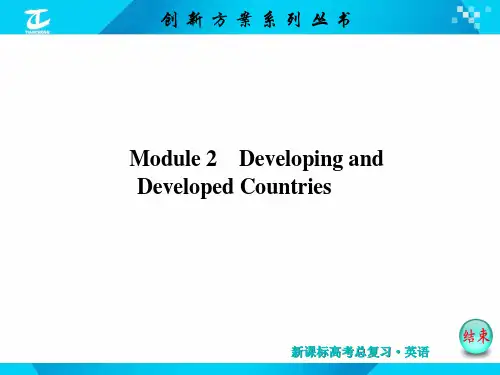
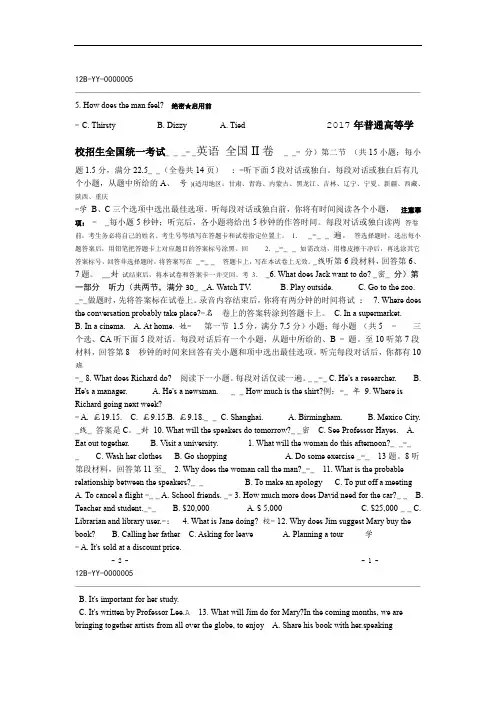
12B-YY-00000055. How does the man feel? 绝密★启用前-C. Thirsty B. Dizzy A. Tied 2017年普通高等学校招生全国统一考试_ _ _-_英语全国II卷 _ _-分)第二节(共15小题;每小题1.5分,满分22.5_ _(全卷共14页):-听下面5段对话或独白。
每段对话或独白后有几个小题,从题中所给的A、号)(适用地区:甘肃、青海、内蒙古、黑龙江、吉林、辽宁、宁夏、新疆、西藏、陕西、重庆-学B、C三个选项中选出最佳选项。
听每段对话或独白前,你将有时间阅读各个小题,注意事项: - _每小题5秒钟;听完后,各小题将给出5秒钟的作答时间。
每段对话或独白读两答卷前,考生务必将自己的姓名、考生号等填写在答题卡和试卷指定位置上。
1._-_ _ 遍。
答选择题时,选出每小题答案后,用铅笔把答题卡上对应题目的答案标号涂黑。
回2._-_ _ 如需改动,用橡皮擦干净后,再选涂其它答案标号,回答非选择题时,将答案写在_-_ _ 答题卡上,写在本试卷上无效。
_线听第6段材料,回答第6、7题。
__封试结束后,将本试卷和答案卡一并交回。
考3._6. What does Jack want to do? _密_分)第一部分听力(共两节,满分30_ _A. Watch TV. B. Play outside. C. Go to the zoo. _-_做题时,先将答案标在试卷上。
录音内容结束后,你将有两分钟的时间将试:7. Where does the conversation probably take place?-名卷上的答案转涂到答题卡上。
C. In a supermarket.B. In a cinema. A. At home. 姓- 第一节1.5分,满分7.5分)小题;每小题(共5- 三个选、CA听下面5段对话。
每段对话后有一个小题,从题中所给的、B -题。
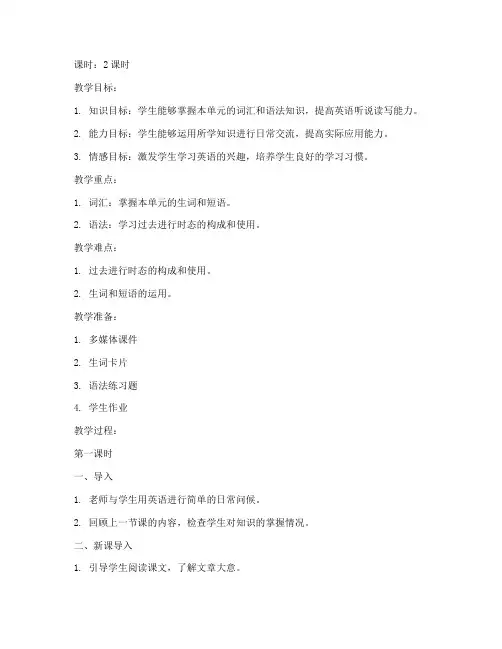
课时:2课时教学目标:1. 知识目标:学生能够掌握本单元的词汇和语法知识,提高英语听说读写能力。
2. 能力目标:学生能够运用所学知识进行日常交流,提高实际应用能力。
3. 情感目标:激发学生学习英语的兴趣,培养学生良好的学习习惯。
教学重点:1. 词汇:掌握本单元的生词和短语。
2. 语法:学习过去进行时态的构成和使用。
教学难点:1. 过去进行时态的构成和使用。
2. 生词和短语的运用。
教学准备:1. 多媒体课件2. 生词卡片3. 语法练习题4. 学生作业教学过程:第一课时一、导入1. 老师与学生用英语进行简单的日常问候。
2. 回顾上一节课的内容,检查学生对知识的掌握情况。
二、新课导入1. 引导学生阅读课文,了解文章大意。
2. 分析文章结构,讲解本单元的语法和词汇。
三、词汇教学1. 教师展示生词卡片,引导学生朗读并拼写。
2. 通过例句,讲解生词在语境中的用法。
3. 学生分组练习,运用生词进行对话。
四、语法教学1. 讲解过去进行时态的构成:主语 + was/were + 动词的ing形式。
2. 通过例句,讲解过去进行时态的用法。
3. 学生练习语法,完成相关练习题。
五、阅读教学1. 学生阅读课文,理解文章内容。
2. 老师提问,检查学生对文章的理解。
3. 学生分组讨论,分享自己的观点。
六、总结1. 老师对本节课的内容进行总结,强调重点和难点。
2. 学生复述本节课所学知识。
第二课时一、复习导入1. 学生用英语进行简单的日常问候。
2. 回顾上一节课的内容,检查学生对知识的掌握情况。
二、听力训练1. 学生听录音,回答相关问题。
2. 老师讲解听力技巧,提高学生的听力水平。
三、口语训练1. 学生分组进行角色扮演,运用所学知识进行对话。
2. 老师巡回指导,纠正学生的发音和语法错误。
四、写作训练1. 学生根据本单元的主题,写一篇短文。
2. 老师批改学生的作文,给予指导和建议。
五、总结1. 老师对本节课的内容进行总结,强调重点和难点。
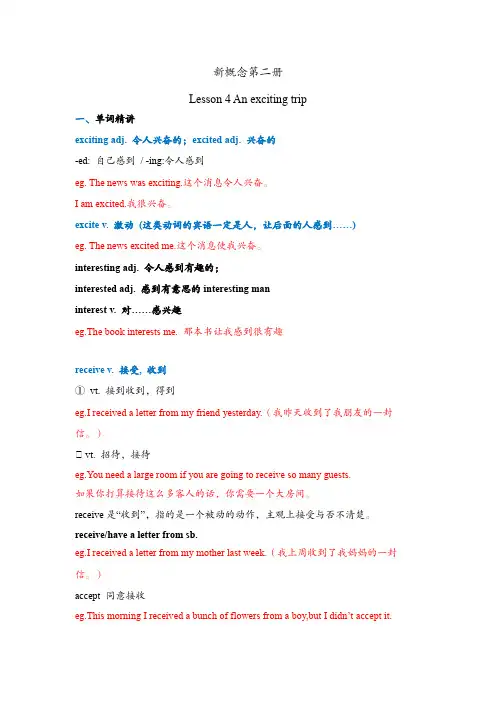
新概念第二册Lesson 4 An exciting trip一、单词精讲exciting adj. 令人兴奋的;excited adj. 兴奋的-ed: 自己感到/ -ing:令人感到eg. The news was exciting.这个消息令人兴奋。
I am excited.我很兴奋。
excite v. 激动(这类动词的宾语一定是人,让后面的人感到……)eg. The news excited me.这个消息使我兴奋。
interesting adj. 令人感到有趣的;interested adj. 感到有意思的interesting maninterest v. 对……感兴趣eg.The book interests me. 那本书让我感到很有趣receive v. 接受, 收到①vt. 接到收到,得到eg.I received a letter from my friend yesterday.(我昨天收到了我朋友的一封信。
)② vt. 招待,接待eg.You need a large room if you are going to receive so many guests.如果你打算接待这么多客人的话,你需要一个大房间。
receive是“收到”,指的是一个被动的动作,主观上接受与否不清楚。
receive/have a letter from sb.eg.I received a letter from my mother last week.(我上周收到了我妈妈的一封信。
)accept 同意接收eg.This morning I received a bunch of flowers from a boy,but I didn’t accept it.今天早上我收到了一个男孩送的一束花,但我没有接受。
take则是主动的“拿”、“取”eg.I received a beautiful pen from my uncle. My brother took it from me yesterday.我收到了叔叔送的一支漂亮的钢笔。
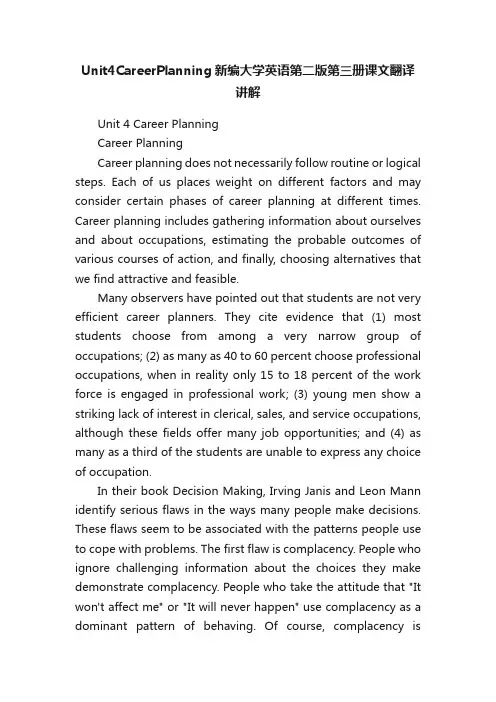
Unit4CareerPlanning新编大学英语第二版第三册课文翻译讲解Unit 4 Career PlanningCareer PlanningCareer planning does not necessarily follow routine or logical steps. Each of us places weight on different factors and may consider certain phases of career planning at different times. Career planning includes gathering information about ourselves and about occupations, estimating the probable outcomes of various courses of action, and finally, choosing alternatives that we find attractive and feasible.Many observers have pointed out that students are not very efficient career planners. They cite evidence that (1) most students choose from among a very narrow group of occupations; (2) as many as 40 to 60 percent choose professional occupations, when in reality only 15 to 18 percent of the work force is engaged in professional work; (3) young men show a striking lack of interest in clerical, sales, and service occupations, although these fields offer many job opportunities; and (4) as many as a third of the students are unable to express any choice of occupation.In their book Decision Making, Irving Janis and Leon Mann identify serious flaws in the ways many people make decisions. These flaws seem to be associated with the patterns people use to cope with problems. The first flaw is complacency. People who ignore challenging information about the choices they make demonstrate complacency. People who take the attitude that "It won't affect me" or "It will never happen" use complacency as a dominant pattern of behaving. Of course, complacency isappropriate for any decision in which nothing much is at stake, but that does not describe career decisions.A second flaw in the way people cope with decisions is defensive avoidance. When confronted with a decision and unable to believe they can find an acceptable solution, some people remain calm by resorting to wishful thinking or daydreaming. Students who fail to think about the implications of their career choices often engage in rationalization (deceiving oneself with self-satisfying but incorrect explanations for one's behavior) or procrastination (putting off or delaying). Facing the situation may produce anxiety, but examining alternatives could also bring relief.A third flaw is hyper vigilance. This occurs in career decision making when people believe there is not enough time to find a solution and they panic. They search frantically for career possibilities and seize on hastily invented solutions, overlooking the consequences of their choice as well as other alternatives. People who are in a panic sometimes do not think clearly or logically.The best coping behavior is vigilance. Vigilant decision making occurs when people believe that (1) a choice should be made, (2) they can find a solution, and (3) there is enough time. Under these conditions, students can conduct an effective search for alternative careers, carefully evaluate each alternative, and work out contingency plans in case one or another risk appears.Following are the keys to career planning.1) Study yourself. This is the key to career planning. Understanding what you are like, what you value, and what you want to become is the foundation for all career planning. In studying yourself, you examine your strengths and weaknesses,your goals, and the trends in your personal development. The self-understanding that you gain enables you to imagine how certain occupations may best fit your personality, interests, abilities, and goals. All career decisions require us to learn both about ourselves and about work, and to integrate these two kinds of knowledge.2) Write your career goals down. A technique useful for organizing ideas about your career development is actually to write them down by time blocks in your life. Writing something down forces you to crystallize your thinking and to recognize unclear and half-formed ideas. It may lead to new insights into your possibilities and may help you to see new relationships, patterns, and trends, or to identify gaps in your thinking about your career development.3) Review your plans and progress periodically with another person. Every so often, take stock of your situation and consider what steps have to be taken next. T aking inventory of progress and planning further steps can help you cope with the changes that you undergo and the changes that take place in the labor market. Talking over your plans with a college counselor, your parents, and your friends helps you define your goals and improve your career plans or make them work.4) If you choose a career that does not fit you, you can start over. Today, growing numbers of men and women are changing careers or getting second starts in careers that have greater appeal to them. Many of those who find that their line of work is unsatisfactory retrain themselves for a different occupation. Often their new occupation is one that they overlooked when they were young or that they did not have an opportunity to pursue at that time for financial or other reasons.Sociologists say that there are few changes in careers that involve "downward" movement; most involve the traditional business of "getting ahead". Society no longer attaches the stigma of "instability" to the idea of career hopping, as it once did.Job changes and career shifts occur at all ages. It has been estimated that as many as one out of four male workers between the ages of twenty and twenty-five change their lines of work. About half that number do so between the ages of twenty-five and forty-four.Career planning does not guarantee that all the problems, difficulties, or decision-making situations that face you in the future will be solved or made any easier. No formula can be given to do that. But career planning should help you to approach and cope better with new problems, such as deciding whether or not to enter educational or training programs, deciding whether or not to change jobs, and analyzing the difficulties you are having with a situation or a person.Nobody can foresee what the future holds for any of us. There are social, emotional, and moral considerations in our future that cannot be foreseen. But the most important lesson of this often unhappy modern world is that progress comes from planning. Ignorance about one's career is not bliss; reason is better than chance and fate. Although there is no sure way to make career plans work out, there are things that you can do now to shape your career possibilities.Career Planning1 进行择业规划不一定要遵照常规的或合乎逻辑的步骤。
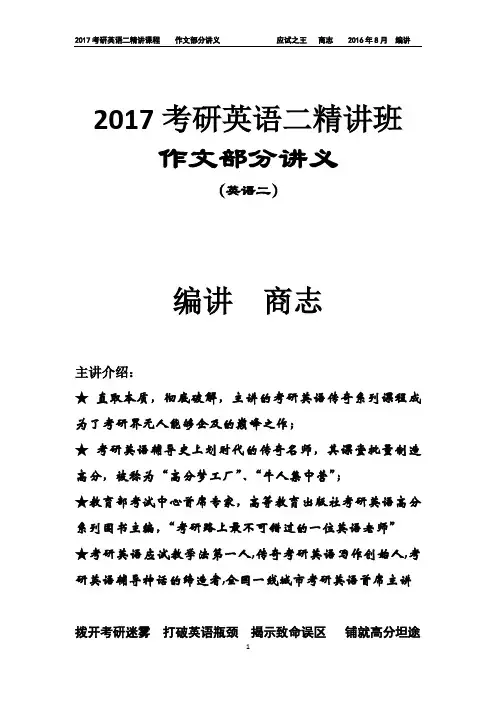
2017考研英语二精讲班作文部分讲义(英语二)编讲商志主讲介绍:★直取本质,彻底破解,主讲的考研英语传奇系列课程成为了考研界无人能够企及的巅峰之作;★考研英语辅导史上划时代的传奇名师,其课堂批量制造高分,被称为“高分梦工厂”、“牛人集中营”;★教育部考试中心首席专家,高等教育出版社考研英语高分系列图书主编,“考研路上最不可错过的一位英语老师”★考研英语应试教学法第一人,传奇考研英语写作创始人,考研英语辅导神话的缔造者,全国一线城市考研英语首席主讲拨开考研迷雾打破英语瓶颈揭示致命误区铺就高分坦途Section One 总论I.《全国硕士研究生入学统一考试英语考试大纲》规定:考生应能写不同类型的应用文,包括私人和公务信函、备忘录、摘要、报告等,还应能写一般描写性、叙述性和说明或议论性的文章。
短文写作时,考生应能:1)做到语法、拼写、标点正确,用词恰当;2)遵循文章的特定文体格式;3)合理组织文章结构,使其内容统一、连贯;4)根据写作目的和特定读者,恰当选用语域。
II.评分原则和方法:虽然A、B两节的考查要点有所不同,但对考生写作能力的基本要求是相同的,所以评分标准对两节都适用。
但根据两节不同的考查要点,评分时会有不同的侧重点。
评分标准:不同的侧重点:A节:1、应用文的评分侧重点在于信息点的覆盖和内容的组织、语言的准确性、格式和语域的恰当。
2、对语法结构和词汇多样性的要求将根据具体试题做调整。
3、允许在作文中使用提示语中出现过的关键词,但使用提示语中出现过才词组或句子将被扣分。
B节:1、大作文的评分重点在于内容的完整性、文章的组织连贯性、语法结构和词汇的多样性及语言的准确性。
2、评分时,先根据文章的内容和语言确定其所属档次,然后以该档次的要求来给分。
评分人员在档内有1~3分的调节分。
3、拼写与标点符号是语言准确性的一个方面。
评分时,视其对实际交际的影响程度予以考虑。
英、美拼写及词汇用法均可接受。
4、如书写较差,以致影响交际,将分数降低一个档次。
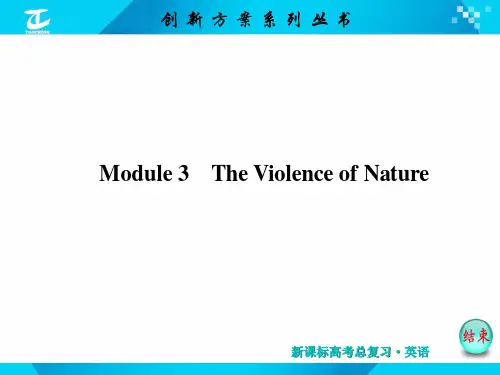
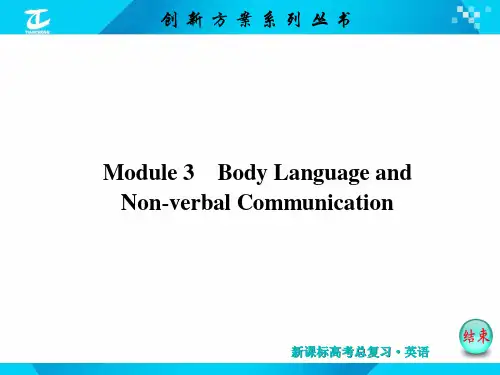
![[配套k12学习]江苏专用2016_2017学年高中英语Unit2LanguagePeriodFourProject讲义牛津译林版必修3](https://uimg.taocdn.com/81b19a1c0066f5335a812199.webp)
Period Four ProjectⅠ.单词自测1.differ vi.相异,有区别difference n.差别different adj.不同的differently adv.不同地,有差别地2.deed n.行为,行动3.hunt vt.& vi.打猎,猎杀;搜寻4.appearance n.外观,外貌appear vi.出现,出场5.represent vt.代表;展示,描绘6. simplify vt.简化simple adj.简单的simply adv.简单地;简明地7.combine vt.& vi.组合;(使)联合8.distinguish vt.区分,辨别;使具有某种特征9.indicate vt.显示,表示;象征,暗示indication n.征兆,迹象;指示10.shortcoming n.缺点,短处11.press vt.(被)压,挤,推,施加压力;n.报刊;新闻界;出版社12.convenient adj.方便的conveniently adv.方便地,便利地convenience n.方便,便利13.battle n.& vi. 战斗14.pattern n.图案,花纹;模式,方式15.drag vt.(使劲地)拖,拉16.practical adj.切实可行的,实用的practice n.& vt.实践;应用;练习17.thus adv.以此方式;如此;因此,从而18.version n.版本Ⅱ.短语自测1.differ from 与……不同,不同于2.instead of 代替,而不是3.stand for 代表,象征4.as a whole 作为整体,总体上5.turn into 变成6.in the 1950s 二十世纪五十年代7.think of 想到8.as a result of 由于Ⅰ.阅读P38课文,选出最佳答案1.The main difference between the Chinese language and many Western languages should be that according to the passage.A.Western languages are usually formed by combining and mixing many different languages from different countriesB.the characters the Chinese language uses have meanings and can work alone as words, while Western languages can’tC.the Chinese language has a longer history than Western languagesD.the Chinese language is easier to be understood than Western languages答案 B2.From the story of Cang Jie we know the first Chinese characters were invented to represent .A.objects B.ideas C.actions D.pictures答案 A3.Whi ch is the correct explanation about the forming of the character “休”?A.A man lying on the ground with his arms crossed.B.A man lying against a tree.C.A man running.D.A tree lying beside a man.答案 B4.Which of the following is formed with one part showing the pronunciation and theother indicating the meaning?A.明 B.囚 C.卡 D.吓答案 D5.The passage is mainly talking about .A.how the Chinese characters were inventedB.how the Chinese characters have developedC.how the Chinese characters have been influenced by Western languages D.how the simplified Chinese characters were introduced答案 BⅡ.阅读课文完成下表,每空一词1.differ[语境感悟](1)(教材P38)The Chinese language differs from Western languages in that ,insteadof an alphabet ,it uses characters which stand for ideas ,objects or deeds. 汉语与西方语言的不同之处在于它不使用字母,而是用汉字表达思想、物体和行为。
创新⼤学英语预备级Unit-2-讲义Unit 2 Today’s Answers to Tomorrow’s QuestionsPart one Leading-inLeading-in1.Listen to the song and fill the blanks.2.Answer the questionsPart Two Intensive ReadingPre-reading:Leading-inWe know the title of this unit is dream, so there is a simple question for you.Boys, what's your dream now?To graduate smoothly and get a good job.To work hard and be the best students and won the best student scholarship.To be good at the professional knowledge so as to become a distinguished person in the field.Girls, what's your dream now?To work hard and pass the exam.To make many friends.To be a office lady.New words and expressions.Guide Ss to read and remember the new words in class.While-reading:Text—Flying with the Dream1. Skim the text quickly and figure out the text organization, at the same time, retell the main idea of the text. (10')2. Explain the text in detail.(45')1)Assignment: n. a task or piece of works that sb. Is given to do, usually as part oftheir job or studies.2)give sb. assignment to do sthShe gladly accepted the assignment.3)Assign: v. to give sb. a particular job or make them responsible for a particular person or thing.I’ve been assigned the task of looking after the new students.Jan’s been assigned t o the Asian Affairs.4)raise: v.a.to bring up; to rear 抚养,抚育Stan’s dad died, leaving his mother to raise three sons alone.Camus was born and raised in Algeria.b.to collect money that you can use to do a particular job or help people 筹集The company hopes to raise $1 million to buy land.They are raising funds to help needy youngsters.5)when they grew up--- a adverbial clause of time6)in Northern California where she was raised"where she was raised" is a clause to modify "Northern California"7)be fascinated by 迷上,被……迷Some students are fascinated by computer games.8)encounter: vt. to meet sb., or discover or experience sth., especially sb./sth. new, unusual or unexpected 碰到,⾯临She was the most remarkable woman he had ever encountered.How will you deal with it when you encounter an accident?9)go for: to try to get or win something努⼒争取If you really want the job, go for it!You were the one that always told me to go for my dreams, never to settle.10)the teacher told her that.. ( a sentence)it was a " fairy tale"and that none of the occupation she listed were women's jobs.Ask Ss to translate this sentence and make a sentence in this sentence pattern.11)be beaten down by sth.discouragement and negativity (she encountered)whenver she talked about her career12)Jean was scared of her at firstbut grew to respect her firmness and fairness13)Jean felt a rush of the old enthusiasm and with excitement she wrote down all her old dreams.Find the predicate of the sentence/clause, then find its subject14)The next thing that Mrs Slaton said changed the course of Jean's life.Said- Mrs SlatonChanged- the next thing (that Mrs Slaton said)15)When you leave school, if you don't go for your dreams, no one will do it for you. Go for the dream, follow the dream, pursue the dream, realize the dream, make the dream come true..16)It took sb some time to do..., or doing sth10 years of hard workFacing opposition that ranged from A to B17) range from…to…: vary or extend between specified limits 从……到……不等,在……与……范围内变动There were 30 students in our class whose ages ranged from 17 to 21.Prices range from around $5 to $7.50.18) It was ... thatThe power of word and encouragement gave the girl strength and faith.the strength and faith to pursue her dreamAsk Ss to read the first part together.Explain and translate some difficult sentences.Post-reading:Ask Ss to do Ex.Part Three Listening ComprehensionTask I Listening practice--listen to the word.1.Let Ss take turns to read one group of words respectively, and correct the pronunciation if necessary. (10')2.Write down the vowels on the blackboard, and let Ss read after the teacher. (3')3.Listen to the tape and tick the word you hear. (5')4.Play the recording once again and repeat the word again to the Ss, as well as explain its difference from other word. (7') Task I Listening practice--listen to the conversations.1.Play the tape and make their choice. (3')2.Play it once again and let Ss correct their answers. The teacher repeat and explain some difficulty points to make Ss know the contents of the conversation.(5')3.Listen it once again to see if SS can understand the whole conversation better. (3') Task II Topic-related listening1.Ask Ss to read the questions and the items so as to guess what would be talked in the conversation, also to get familiar with the possible content to be said in the dialogue or the passage. Explain some key words in the items.(8') apartment, salary, appearance, athlete,talent, sweet, sweat2.Listen to the tape and do the exercise. (12')3.Check the answers.(5')Call Ss to read the questions and answers, correct them if there are some mistakes.Part Four Oral Practice1.Let Ss read the useful expressions and try to remember some that they are likely to use one day in the future. (15')2. Ask Ss to check out whether the pictures include their dreams, and name the professions according to each picture. (10')3. Read and recite he dialogue in pair and then call Ss to do role play. (15')Part Five Grammar—⾮谓语动词⼀个语句中只能有⼀个谓语动词。
2017年普通高等学校招生全国统一考试(Ⅱ卷)英语第二部分阅读理解(共两节,满分40分)第一节(共15小题;每小题2分,满分30分)阅读下列短文,从每题所给的A、B、C和D四个选项中,选出最佳选项。
AIn the coming months, we are bringing together artists from all over the globe, to enjoy speaking Shakespeare’s plays in their own language, in our Globe, within the architecture Shakespeare wrote for. Please come and join us.National Theatre of China Beijing | ChineseThis great occasion (盛会) will be the National Theatre of China’s first visit to the UK. The company’s productions show the n ew face of 21st century Chinese theatre. This production of Shakespeare’s Richard III will be directed by the National’s Associate Director, Wang Xiaoying .Date & Time: Saturday 28 April, 2.30pm & Sunday 29 April, 1.30pm & 6.30pmMarjanishvili Theatre Tbilisi | GeorgianOne of the most famous theatres in Georgia, the Marjanishvili, founded in 1928, appears regularly at theatre festivals all over the world. This new production of AS You Like It is helmed (指导) by the company’s Artistic Director Levan Tsuladze.Date & Time: Friday 18 May, 2.30pm & Saturday 19 May, 7.30pmDeafinitely Theatre London | British Sign Language(BSL)By translating the rich and humourous text of Love’s Labour’s Lost into the physical language of BSL, Deafinitely Theatre cr eates a new interpretation of Shakespeare’s comedy and aims to build a bridge between deaf and hearing worlds by performing to both groups as one audience.Date & Time: Tuesday 22 May, 2.30pm & Wednesday 23 May, 7.30pmHabima National Theatre Tel Aviv | HebrewThe Habima is the centre of Hebrew-language theatre worldwide. Founded in Moscow after the 1905 revolution, the company eventually settled in Tel Aviv in the late 1920s. Since 1958, they have been recognised as the national theatre of Israel. Thi s production of Shakespeare’s The Merchant of Venice marks their first visit to the UK.Date & Time: Monday 28 May, 7.30 & Tuesday 29 May, 7.30pm21. Which play will be performed by the National Theatre of China?A. Richard III.B. Lover’s Labour’s Lost.C. As You Like It.D. The Merchant of V enice.22. What is special about Deafinitely Theatre?A. It has two groups of actors.B. It is the leading theatre in London.C. It performs plays in BSL.D. It is good at producing comedies.23. When can you see a play in Hebrew?A. On Saturday 28 April.B. On Sunday 29 April.C. On Tuesday 22 May.D. On Tuesday 29 May.BI first met Paul Newman in 1968, when George Roy Hill, the director of Butch Cassidy and the Sundance Kid, introduced us in New York City. When the studio didn’t want me for the film -it wanted somebody as well known as Paul - he stood up for me. I don’t know how many people would have done that; they would have listened to their agents or the studio powers.The friendship that grew out of the experience of making that film and The Sting four years later had its root in the fact that although there was an age difference, we both came from a tradition of theater and live TV. We were respectful of craft(技艺)and focused on digging into the characters we were going to play. Both of us had the qualities and virtues that are typical of American actors: humorous, aggressive, and making fun of each other - but always with an underlying affection. Those were also at the core (核心) of our relationship off the screen.We shared the bel ief that if you’re fortunate enough to have success, you should put something back - he with his Newman’s Own food and his Hole in the Wall camps for kids who are seriously ill, and me with Sun dance and the institute and the festival. Paul and I didn’t see each other all that regularly, but sharing that brought us together. We supported each other financially and by showing up at events.I last saw him a few months ago. He’d been in and out of t he hospital. He and I both knew what the deal was, and we didn’t talk about it. Ours was a relationship that didn’t need a lot of words.24. Why was the studio unwilling to give the role to the author at first?A. Paul Newman wanted it.B. The studio powers didn’t like his agent.C. He wasn’t famous enough.D. The director recommended someone else.25. Why did Paul and the author have a lasting friendship?A. They were of the same age.B. They worked in the same theater.C. They were both good actors.D. They had similar characteristics.26. What does the underlined word “that” in paragraph 3 refer to?A. Their belief.B. Their care for children.C. Their success.D. Their support for each other.27. What is the author’s purpose in writing the te xt?A. To show his love of films.B. To remember a friend.C. To introduce a new movie.D. To share his acting experience.CTerrafugia Inc. said Monday that its new flying car has completed its first flight, bringing the company closer to its goal of selling the flying car within the next year. The vehicle-named the Transition –has two seats,four wheels and wings that fold up so it can be driven like a car. The Transition, which flew at 1,400 feet for eight minutes last month, can reach around 70 miles per hour on the road and 115 in the air. It flies using a 23-gallon tank of gas and burns 5 gallons per hour in the air. On the ground, it gets 35 miles per gallon.Around 100 people have already put down a $10,000 deposit to get a Transition when they go on sale, and those numbers will likely rise after Terrafugia introduces the Transition to the public later this week at the New York Auto Show. But don’t expect it to show up in too many driveways. It’s expected to cost $279,000. And it won’t help if you’re stuck in traffic. The car needs a runway.Inventors have been trying to make flying cars since the 1930s, according to Robert Mann, an airline industry expert. But Mann thinks Terrafugia has come closer than anyone to making the flying car a reality. The government has already permitted the company to use special materials to make it easier for the vehicle to fly. The Transition is now going through crash tests to make sure it meets federal safety standards.Mann said Terrafugia was helped by the Federal Aviation Administration’s decision five years ago to create a separate set of standards for light sport aircraft, which are lower than those for pilots of larger planes. Terrafugia says an owner would need to pass a test and complete 20 hours of flying time to be able to fly the Transition, a requirement pilots would find relatively easy to meet.28. What is the first paragraph mainly about?A. The basic data of the Transition.B. The advantages of flying cars.C. The potential market for flying cars.D. The designers of the Transition.29. Why is the Transition unlikely to show up in too many driveways?A. It causes traffic jams.B. It is difficult to operate.C. It is very expensive.D. It burns too much fuel.30. What is the government’s attitude to the development of the flying car?A. Cautious.B. Favorable.C. Ambiguous.D. Disapproving.31. What is the best title for the text?A. Flying Car at Auto ShowB. The Transition’s Fi rst FlightC. Pilots’ Dream Coming TrueD. Flying Car Closer to RealityDWhen a leafy plant is under attack, it doesn’t sit quietly. Back in 1983, two scientists, Jack Schultz and Ian Baldwin, reported that young maple trees getting bitten by insects send out a particular smell that neighboring plants can get. These chemicals come from the injured parts of the plant and seem to be an alarm. What the plants pump through the air is a mixture of chemicals known as volatile organic compounds, VOCs for short.Scientists have found that all kinds of plants give out VOCs when being at tacked. It’s a plant’s way of crying out. But is anyone listening? Apparently. Because we can watch the neighbors react.Some plants pump out smelly chemicals to keep insects away. But others do double duty. They pump out perfumes designed to attract different insects who are natural enemies to the attackers. Once they arrive, the tables are turned .The attacker who was lunching now becomes lunch.In study after study, it appears that these chemical conversations help the neighbors .The damage is usually more serious on the first plant, but the neighbors, relatively speaking, stay safer because they heard the alarm and knew what to do.Does this mean that plants talk to each other? Scientists don’t know. Maybe the first plant just made a cry of pain or was sending a message to its own branches, and so, in effect, was talking to itself. Perhaps the neighbors just happened to “overhear” the cry. So information was exchanged, but it wasn’t a true, intentional back and forth.Charles Darwin, over 150 years ago, imagined a world far busier, noisier and more intimate(亲密的) than the world we can see and hear. Our senses are weak. There’s a whole lot going on.32. What does a plant do when it is under attack?A. It makes noises.B. It gets help from other plants.C. It stands quietly.D. It sends out certain chemicals.33. What does the author mean by “the tables are turned” in paragraph 3?A. The attackers get attacked.B. The insects gather under the table.C. The plants get ready to fight back.D. The perfumes attract natural enemies.34. Scientists find from their studies that plants can ______.A. predict natural disasterB. protect themselves against insectsC. talk to one another intentionallyD. help their neighbors when necessary35. What can we infer from the last paragraph?A. The world is changing faster than ever.B. People have stronger senses than before.C. The world is more complex than it seems.D. People in Darwin’s time were more imaginative.第二节(共5小题;每小题2分,满分10分)根据短文内容,从短文后的选项中选出能填入空白处的最佳选项。
2017年常州新程专转本英语上课讲义3月5日导学班课程1.He didn't know or go home.A.if to waitB.to waitC.whether to waitD.either to wait2.I can say nothing his school performance as I just began to teach this class today.A.as a result ofB.for the sake ofC.with respect toD.on account of3.The boy was____Tom______his uncle.A.known;asB.called;followingd;afterD.recognized;before4.____radio and TV have changed many aspects of our lives,sc laser will bring about great changes in science and technology.A.Much asB.As far asC.Just asD.As for5.Many people favor_____more nuclear power plants.A.to buildB.buildC.builtD.building6.If you____that night,you might have been too late to get your ticket.A.didn't hurryB.hadn't hurriedC.wouldn't hurryD.hadn't to hurry7.The terrorists to blow up the plane if their demands were not met.A.pretendedB.determinedC.threatenedD.proceeded8.It is generally thought to be of importance to a man that he himself.A.knewB.knowC.knowsD.must know9.My friends us into going swimming.A.persuadedB.toldC.invitedD.suggested10.The total cultivated area is13000acres,10000acres are irrigated fields.A.whichB.of whichC.in thatD.of that11.We must begin testing this instrument,no matter difficult it is.A.howeverB.howC.whateverD.what12.The windows are small as not to admit much light at all.A.veryB.asC.tooD.so13.Some of this wheat came from Canada.What about?A.anotherB.the otherC.othersD.the rest14.I will now Mr Webster to drink the health of the happy pair.A.call onB.call upC.call forD.call off15.July is the month is usually the hottest.A.whose weatherB.the weatherC.its weatherD.when the weather16.Because my scissors are dull,I'm going to buy a new.A.oneB.onesC.pairD.scissors17.great was the destruction that the South took decades to recover.A.VeryB.TooC.SuchD.Soernment cannot operate effectively it is free from such interference.A.so long asB.if onlyC.unlessD.lest19.He makes a good living selling used car.A.forB.toC.ofD.out of20.We'd better start early.We don't want to risk in the traffic.A.to be caughtB.being caughtC.to have been caughtD.having been caught21.When I passed the office,I heard my name.A.mentionedB.mentionC.be mentionedD.to mention22.It was after he had made a thorough investigation he came to know the actual state of affairs.A.thatB.thenC.so thatD.therefore23.The man for his frankness,will make a speech at the meeting.A.knowingB.knownC.being knownD.having known24.A fence needs the support of three stakes,?A..needn't it.B.doesn't itC.shan't itD.isn't it25.Some of the greatest scholars are incapable when it comes on their knowledge to others.A.to passingB.passC.have it passedD.having it passed26.The Rocky Mountains we will soon be flying are very beautiful.A.thatB.over whichC.whenD.which27.You are permitted into the cinema for the film,you sat at the back.A.seeing thatB.for fear thatC.provided thatD.in order that28.his carelessness,he failed the examination.A.In spite ofB.In case ofC.In regard toD.On account of29.I couldn't understand the lecture,and.A.neither could SueB.so couldn't SueC.Sue couldn't neitherD.Sue couldn't also30.We had to dried milk as fresh milk wasn't available.A.face up toB.fall back onC.add up toD.put up with31.If it too much trouble I'd love a cup of tea.A.isn'tB.weren'tC.wasn'tD.hadn't been32.After seemed an endless wait,it was his turn to step into the doctor's office.A.itB.thatC.whatD.there33.She's going to the photographer's.A.to have her photograph takeB.to have her photograph takingC.to have her photograph takenD.to have taken her photograph34.Because of the emphasis placed on classroom work,the instructor will report your absences to the adviser.rgeB.hardC.strongD.high35.you decide to take up,you should try to make it a success.A.If onlyB.UnlessC.WhereverD.Whatever36.Everyone should keep a sense of responsibility what he is to do.A.ofB.forC.withD.to37.The statue is believed by a professional thief a couple of weeks ago.A.to have stolenB.to be stolenC.having been stolenD.to have been stolen38.Neither Bill nor his parents at home.A.areB.isC.wasD.has39.I don't think there are several characteristics of the novel special attention.A.worthwhileB.worth ofC.worthy ofD.worthless40.people can speak a foreign language perfectly.A.Not muchB.LittleC.Only a small numberD.Few二基础句子翻译1.没有人知道谁应该对这个事故负责。
2017年第二次全国大联考【江苏卷】英语·原卷版第一部分听力(共两节,满分30分)做题时,先将答案标在试卷上。
录音内容结束后,你将有两分钟的时间将试卷上的答案转涂到答题卡上。
第一节(共5小题;每小题1.5分,满分7.5分)听下面5段对话。
每段对话后有一个小题,从题中所给的A、B、C三个选项中选出最佳选项,并标在试卷的相应位置。
听完每段对话后,你都有10秒钟的时间来回答有关小题和阅读下一小题。
每段对话仅读一遍。
例:How much is the shirt?A. £19.15.B. £ 9.18.C. £ 9.15.答案是C。
1. What is the possible relationship between the speakers?A. Classmates.B. Colleagues.C. Teacher and student.2. What is the problem with Joan?A. She suffers from a headache.B. She has an upset stomach.C. She catches a bad cold.3. What did the speakers plan to do?A. Go for a walk.B. Have a picnic.C. Play a game.4. Why does Jack have to work on Sunday?A. To prepare for his lecture.B. To finish his paper.C. To support his family.5. What are the speakers talking about?A. A crazy driver.B. New traffic rules.C. A traffic accident.第二节(共15小题;每小题1.5分,满分22.5分)听下面5段对话或独白。
2017年常州新程专转本英语上课讲义3月4日基础课程
一.和转本翻译有关的英汉差异
1.形合和意合
E:语言的词语、分句以及句子借助语言形式手段(如连接词)来实现词语与句子的衔接,表达语法意义和逻辑关系。
英语重形合。
(竹节)
C:结构松弛,多以结构简单的单句,其彼此的逻辑关系多以句序之先后加以暗示。
汉语重意合。
(流水)
他不来,我就不去。
If he does not come,will not go.
冬天来了,春天还会远吗?
If winter comes,can spring be far away?
史密斯先生自己还不知道犯了什么罪,人家就把他逮捕了.
翻译启示:
2.被动和主动
中国人有‘天人合一’的观念,强调人与自然的浑然统一,因而汉语句子习惯用人做主语,英美人则较为客观,因而英语句子常以物或抽象概念做主语。
例如,汉语习惯说“我见过的最美的风景之一”,主语是第一人称代词“我”,强调“人”;英语则说“It was one of the most beautiful scenery that I had ever seen.”再如,it is reported that.
My holiday afternoons were spent in ramble about the surrounding country.
It was accepted in the past that men are supposed to earn bread and butter for the family,while women are to take care of family.
翻译启示:
二.翻译的定义、标准和方法
1.定义
2.标准
3.方法
三.专转本英语考点
1.固定搭配
2.语法(从句、被动、虚拟语气等)
四.翻译实践
1.没有人知道谁应该对这个事故负责。
2.他们希望有更多机会把知识付诸于实践。
3.整天玩电脑游戏没有任何意义。
4.英语在找工作时还是很有用的。
5.他们正忙于准备期末考试。
6.约翰在全神贯注地读书,没有注意到我们进来。
7大学毕业生要学会尽快适应社会。
8如果你听了我的建议,现在就不会后悔了。
9经济对我们生活的影响太大了。
10他没能履行自己的诺言,所以他很难受。
11校车事故引起了全国人民的关注。
12我们应该在学习和兼职方面搞好平衡
13和发达国家相比,我们技术还是落后。
14只要我们多花时间这个项目上,就可以按时完成。
15让我惊奇的是,他们居然成功了。
16你真的太慷慨了,把这么多的钱捐给(donate)这些贫穷家庭。
17考试前好好睡个觉还是很重要的。
18无论我们谈论什么,汤姆都想参与讨论。
19爬的越高,你看到的风景就越美。
20在医生和护士的帮助下,这个病人很快恢复了。
21这个问题太难,我们花了两个星期才解决它。
22员工因为错误而向老板道歉。
23由于交通堵塞,他没能按时达到博物馆。